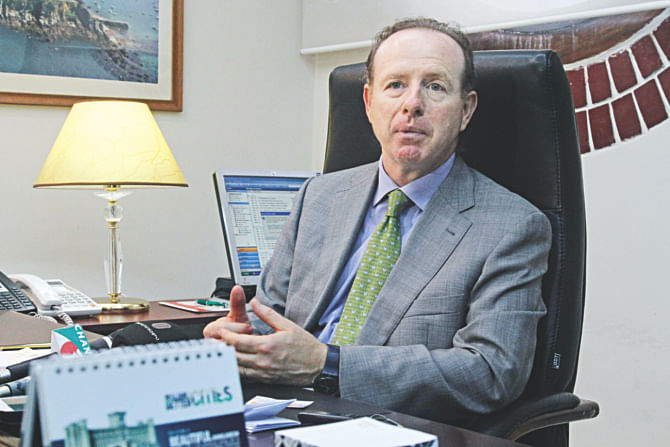Garment exports to Spain to soar: envoy

The country's apparel exports to Spain are expected to go up following improvements in factory conditions, Spanish Ambassador Luis Tejada said yesterday.
After the Rana Plaza building collapse, the country has undertaken several initiatives to upgrade the garment industry, which will encourage Spanish clothing retailers to buy more from here, he said.
"It is a good sign. Spanish retailers will not have to look beyond Bangladesh to procure apparel," he said, while citing the case of Vintage Denim Studio Ltd at Ishwardi EPZ.
Tejada was very impressed with the factory, going so far as to term it “one of the best factories in the world."
Factory owners have already undertaken reform initiatives and others will begin in the months to come, he said.
The envoy was speaking to a group of journalists at his office in Dhaka.
Bangladesh, the second largest garment exporter after China, can grab more orders from Spain as “the country can offer very good prices and supply in large quantities".
Spanish retail chain Inditex Group, which manages eight brands -- Zara, Pull and Bear, Massimo Dutti, Bershka, Stradivarius, Oysho, Zara Home and Uterqüe -- is a leading buyer of Bangladeshi apparel, he said.
In fiscal 2013-14, the country exported apparel worth $1.5 billion to Spain, up 24 percent year-on-year.
The amount is 93 percent of overall exports to the country, according to data from the Bangladesh Garment Manufacturers and Exporters Association. The European Union, the country's largest export destination, accounted for 60.21 percent of overall apparel exports of $24.49 billion last fiscal year.
The diplomat also stressed the need for a more friendly relationship between factory owners and workers. Factory owners should begin “a sustainable social dialogue between trade unions and workers” to ensure workplace safety, he said. With completion of preliminary inspections of 1,700 factories by two foreign garment factory inspecting agencies, only three were shut -- a major step forward in garment-factory safety in Bangladesh.
On the generalised system of preferences (GSP) offered by the EU to Bangladesh, he said the country should go for more free trade agreements (FTA) with the EU countries as it would lose the duty benefit as soon as it becomes a middle-income country. “Bangladesh is a big country; even though the per capita income is low, the size of the economy is large. It can negotiate FTAs with the European countries,” said Tejada.
As a least developed country, Bangladesh now enjoys full duty- and quota-free access under the 'everything but arms' category in the EU market.

 For all latest news, follow The Daily Star's Google News channel.
For all latest news, follow The Daily Star's Google News channel. 



Comments